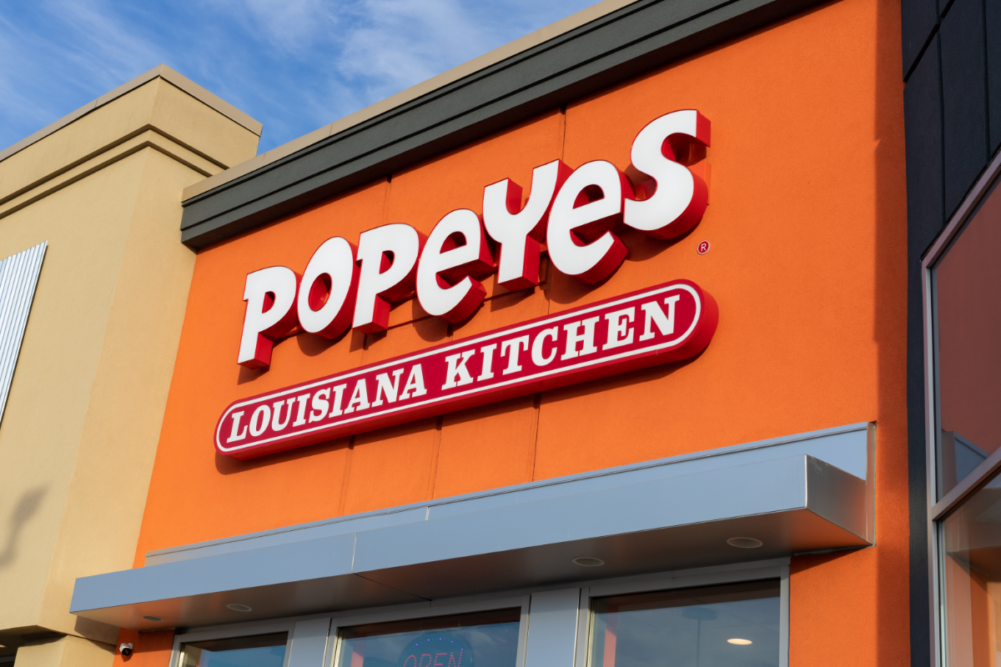TORONTO — Comparable-store sales in the United States decreased in the third quarter for both Popeyes and Burger King but for different reasons. A labor shortage reduced operating hours, and thus sales, at Popeyes. Disappointing results in promotional offerings and a move away from paper coupons were factors at Burger King.
Toronto-based Restaurant Brands International owns Popeyes, Burger King and Tim Hortons. The stock price for Restaurant Brands International on the New York Stock Exchange fell 5% on Oct. 25, the day third-quarter results were announced, to close at $58.85 per share.
Comparable-store sales in the quarter ended Sept. 30 declined by 2.4% overall at Popeyes, including 4.5% in the United States. Ongoing labor challenges led to reduced service modes and operating hours, particularly in late night, said José Cil, chief executive officer of Restaurant Brands International, in an Oct. 25 earnings call.
“On operating hours, we saw about an average of one-hour reduction in operating hours at Popeyes during this quarter relative to pre-pandemic levels, which obviously has an impact in that, that was disproportionately impacting our late-night business, which historically over-indexes in family and which comes along with a pretty high check,” he said.
Matthew Dunnigan, chief financial officer for Restaurant Brands International, added, “On the labor front, we're looking at ways we can simplify life in the restaurants, looking at processes, looking at simplifying the menu.”
Comparable-store sales at Burger King increased by 8% overall, but they declined by 1.6% in the United States.
“On value offerings, this quarter’s core offers of BOGO (buy one, get one) plus $1 and 2 for $6 yielded a considerable year-over-year gap against last year’s 2 for $5, while also facing headwinds from competitor core discount offerings,” Mr. Cil said.
Future promotions could focus on the Whopper, the “hero product” of Burger King.
“All our data shows our flame-grilled Whopper outperforms the hero product of our competitors, yet many of our burger promotions for the last few years have focused on sub-brands or extensions to our core rather than doubling down on our flagship hero product,” Mr. Cil said.
Burger King in the United States over-indexes in paper coupons, using three times as many coupons as most of its peers, Mr. Cil said, but the effectiveness of paper coupons, especially with younger consumers, has eroded over time.
“We know this decision will impact our results in the near term but believe it's the right one as we focus on building more sustainable long-term sales through our digital platforms and by maximizing media firepower behind growing channels with increasingly tailored offerings for our guests,” he said of getting away from paper coupons.
Tom Curtis was named president of Burger King U.S. and Canada in August.
“Tom has now spent most of the last two months visiting with franchisees across the US and zeroing in on our biggest operations opportunities in addition to gathering feedback on our menu, digital and image programs,” Mr. Cil said. “What's clear from his initial observations is that we have a great brand and assets to build from, but we need to double down on putting the guest experience at the center of all of our efforts. Tom and the team have been hard at work in partnership with our franchisees to build a focused plan to reclaim our market share and put us on track for long-term sustainable growth.”
Burger King international restaurants now generate about 60% of the brand’s systemwide sales, which is up from about 45% in 2012. International restaurant count has doubled over that time to nearly 12,000 locations.
Restaurant Brands International achieved net income of $221 million, or 71¢ per share on the common stock, in the third quarter, which was up 52% from $145 million, or 48¢ per share, in the same time of the previous year. Total revenues of $1.5 billion were up 12% from $1.34 billion. Comparable-store sales at Tim Hortons rose 9%. Over the first nine months of the fiscal year, Restaurant Brands International had net income of $659 million, or $2.14 per share on the common stock, which was up 67% from $395 million, or $1.31 per share, in the same time of the previous year. Nine-month total revenues rose 16% to $4.19 billion from $3.61 billion.





